Friday, August 29, 2008, 15:19 - Travel, Photo of the Day
BrooklynToday I am off to France and Rochefort-en-Terre! I will leave shortly but just wanted to let all you in New York know that I will miss you but of course you can stay up to date on my adventures by tuning in right here! See you soon…
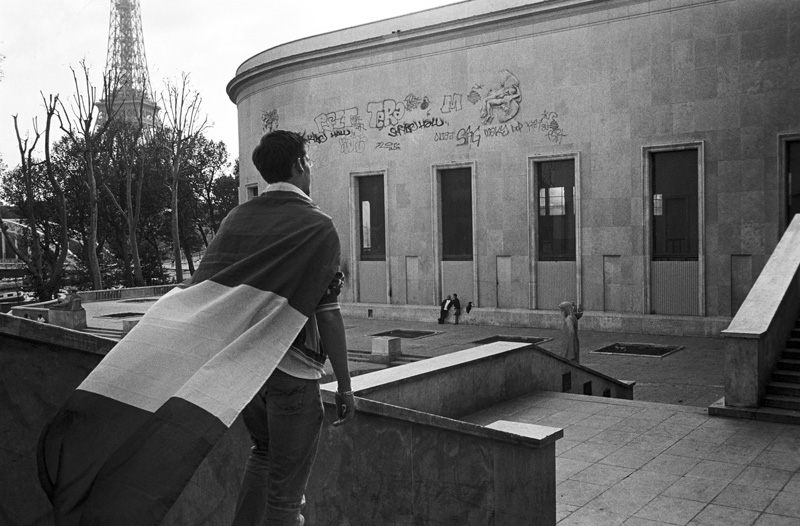
La belle France! 2007 © Damaso Reyes
| 0 trackbacks
| 



 ( 3 / 2025 )
( 3 / 2025 )




 ( 3 / 2025 )
( 3 / 2025 )
Wednesday, August 27, 2008, 20:16 - Commentary, Photo of the Day
BrooklynJust two days to go until I take off for France and of course I have too much to do. But of course the news never stops and if you have some time check out this interesting article about the E.U.’s response to the conflict between Russia and Georgia, I feel it nicely sums up the issues:
“The E.U. always has trouble speaking with a single voice,” said Charles Kupchan, a senior fellow at the Council on Foreign Relations and professor of international affairs at Georgetown University. “It will find consensus all the more difficult in this crisis. In Central Europe there’s a sense that we told you so, Russia is again an aggressor state. And in Western Europe there is a much more complicated view of the war in Georgia and an unwillingness to jump to the conclusion that it’s time to man the barricades and contain Russia.”
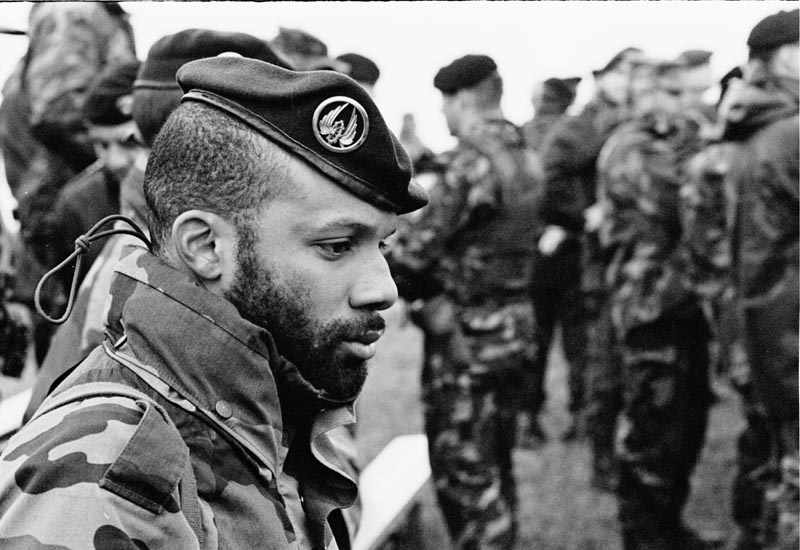
What to do, what to do? Kosovo 2005 © Damaso Reyes
The next few years will no doubt bring many similar foreign policy and military challenges. The question of course is just how the European Union’s member states will choose to deal with them…
Monday, August 25, 2008, 12:59 - Commentary, Photo of the Day
BrooklynAs much as people take photography, and the work that photojournalists do for granted, the impact that our images have on the way people remember and interpret history is profound. This year marks the 40th anniversary of the Soviet invasion of Czechoslovakia and the events in Georgia are a stark reminder of the ways in which history repeats itself.
There is a great article in The Guardian about the Czech photographer Josef Koudelka who documented the Soviet invasion and its aftermath providing the entire world with some of the few images of what happened. Risking his life he took more than 5,000 images in one week of the invasion of Prague and smuggled the images out.
“The previously unseen images, though, are powerful for different reasons. They provide a unique visual record of 20th century history as it unfolded, an event of incredible emotional and political intensity that lasted a week yet changed the course of a nation for two decades afterwards. In one brilliantly composed image after another, Koudelka has also captured the energy of mass protest like no one before or since, an energy that flared from angry disbelief into violent protest and then faded just as suddenly. 'When I look at these pictures now, I can't believe I did them. Magnum could not believe it was the work of one photographer. I was everywhere because everywhere I looked in those seven days there is another photograph waiting for me. I did not have time to even think about the danger.'”
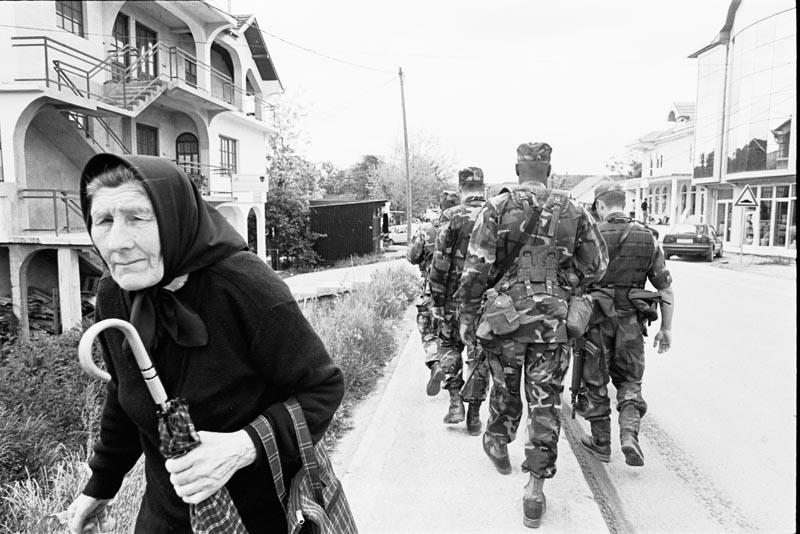
Who will watch the watchmen? Kosovo 2005 © Damaso Reyes
While everyone may have a camera, or camera phone, not everyone can be a photojournalist…
Saturday, August 23, 2008, 12:47 - Commentary
BrooklynIt’s my last weekend in New York and as you can imagine I am super busy! Yesterday also would have been the 100th birthday of HCB. It is hard to understate the impact he has had on photography. I have felt his reach in my own work, especially as I travel throughout Europe. Happy birthday big guy!
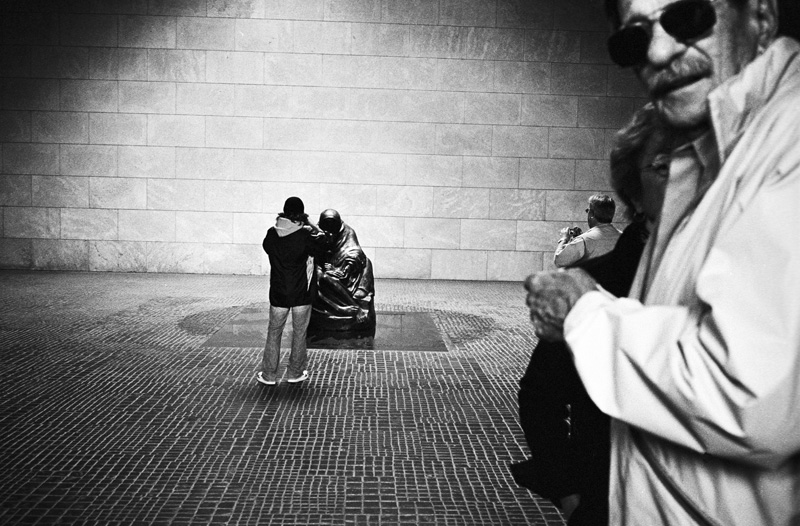
Remembrance of things past. Berlin 2007 © Damaso Reyes
For a subject to be strong enough to be worth photographing, the relationship of its forms must be rigorously established. Composition starts when you situate your camera in space in relation to the object. For me, photography is the exploration in reality of the rhythm of surfaces, lines, or values; the eye carves out its subject, and the camera has only to do its work. That work is simply to print the eye’s decision on film. - Henri Cartier-Bresson
Wednesday, August 20, 2008, 13:02 - Commentary, Photo of the Day
BrooklynIf you haven’t checked The Guardian there is a great unconventional story about immigration. We’ve all heard about how Western Europe needs immigration to deal with its declining birthrate and all that jazz but of course one of the things people fear is the loss of culture and national identity. Well Steven Wells argues that immigration can help save and even infuse rock culture. Here’s a taste:
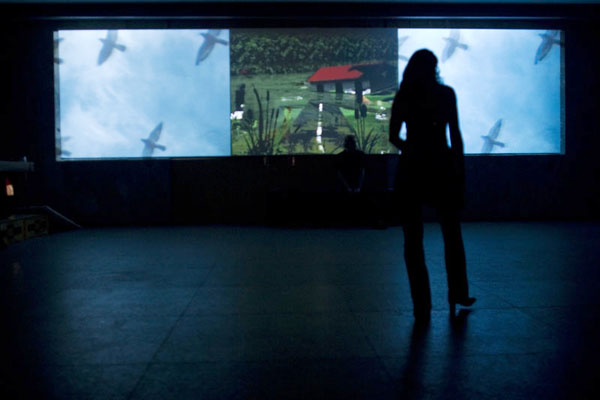
Where is everybody? Stuttgart 2007 © Damaso Reyes
“Meanwhile, the developing world is bursting at the seams with babies, toddlers and teenagers, many of whom would love to come to the West but can't because of bizarre racist immigration policies and the absurd and morally and intellectually indefensible (not to mention anti-democratic and anti-free enterprise) notion that workers shouldn't be allowed to live anywhere in the world they damn well please.
“The solution is obvious. The West needs immigration like the deserts need the rain. To stave off cultural brain death and save rock'n'roll we must throw open the floodgates of immigration. By doing so, the young will once again outnumber the nearly dead - totally revitalizing music and providing "us" with a new generation of both avant garde artists and audiences for avant garde art. Music in particular would experience the dizzying and exhilarating rush of input from dozens of other cultures, hopefully drowning out the dull, smug, self-referential, post-Smiths indie/hipster monoculture once and for all.”
That’s hot…
Tuesday, August 19, 2008, 13:31 - Commentary, Photo of the Day
BrooklynSometimes we need to look at the past to understand what is possible. When we think of documentary photojournalism sometimes we spend more time thinking about Flickr and iPhone cameras than of what is possible when well trained artists do their job well.
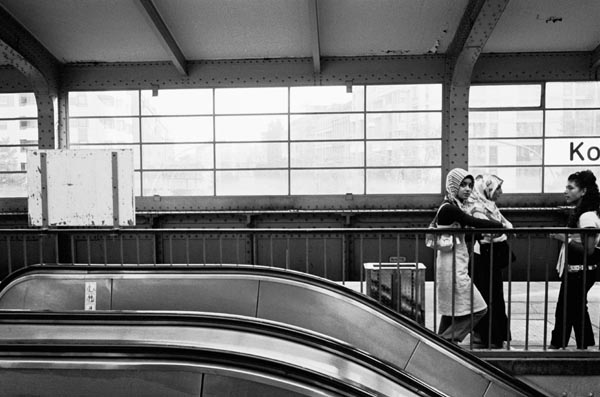
Let us now praise famous men. Berlin 2006 © Damaso Reyes
A great documentary, highlighted in this article, seeks to remind viewers of what an important role photography plays in our conception of ourselves. “Documenting the Face of America: Roy Stryker and the F.S.A./O.W.I. Photographers,” provides an important insight into how the American government of all institutions used photography to highlight the impact of the Great Depression on ordinary people.
Many of the images you will see in this film inspired my own career and belief that images can make a difference. Check it out!
Monday, August 18, 2008, 13:17 - Commentary, Photo of the Day
BrooklynSo the time is ticking away until I head to France and of course I have more on my plate than I can handle. So I might not be blogging quite as much as normal but have no fear, at least they will be interesting posts.
I was on the New York Times website and there was a fascinating article about how ordinary people are using Photoshop to change their personal photographs.
“REMOVING her ex-husband from more than a decade of memories may take a lifetime for Laura Horn, a police emergency dispatcher in Rochester. But removing him from a dozen years of vacation photographs took only hours, with some deft mouse work from a willing friend who was proficient in Photoshop, the popular digital-image editing program.
Like a Stalin-era technician in the Kremlin removing all traces of an out-of-favor official from state photos, the friend erased the husband from numerous cherished pictures taken on cruises and at Caribbean cottages, where he had been standing alongside Ms. Horn, now 50, and other traveling companions.
“In my own reality, I know that these things did happen,” Ms. Horn said. But “without him in them, I can display them. I can look at those pictures and think of the laughter we were sharing, the places we went to.”
“This new reality,” she added, “is a lot more pleasant.”
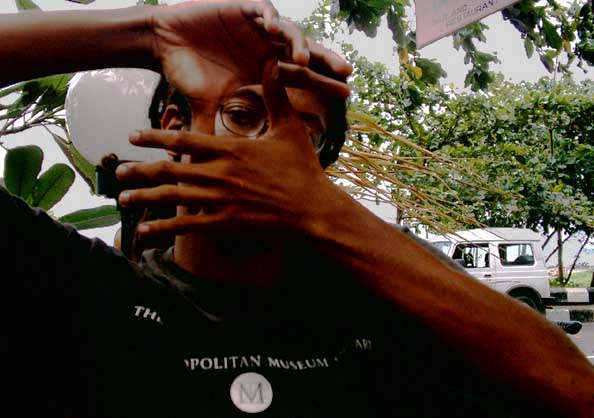
I see what you did there… © Damaso Reyes
One of the challenges we photojournalists face is to accurately (however you define it) portray the world and people around us. While it is not true, people have believed that photography, especially photojournalism does this. But now people are rewriting and recreating their own lives. What does this do to the way we see the world?
When we lose our faith in the veracity of the image, or at least the idea that photographs are by default honest representations of our world, will we believe the images that show us parts of the world we would rather not see like atrocity or injustice?
Clearly our relationship to the image has evolved with the medium but I do feel like we are nearing a watershed moment where we will have ubiquitous access to imagery because of mobile phone cameras and the internet and at the same time not believe most of the photographs we see.
As someone who works to expose what we often ignore I can’t help but feel a little nervous!
Saturday, August 16, 2008, 14:22 - Commentary
BrooklynFor those of you counting it is just two weeks until I head to France! I am as excited as you are to get back to shooting but there is a LOT to do between now and then. So I will get back to it but enjoy your HCB Quote of the Week!
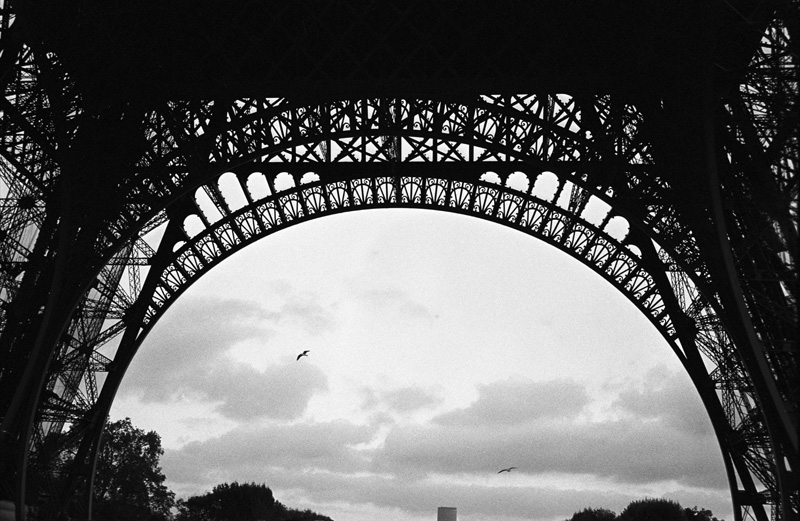
Structure and form. Paris 2007 © Damaso Reyes
The picture is good or not from the moment it was caught in the camera. - Henri Cartier-Bresson
Friday, August 15, 2008, 11:22 - Commentary, Photo of the Day
BrooklynIf you have time check out this super interesting article about a scientist who has developed a genetic map of Europe.

“The genetic map of Europe bears a clear structural similarity to the geographic map. The major genetic differences are between populations of the north and south (the vertical axis of the map shows north-south differences, the horizontal axis those of east-west). The area assigned to each population reflects the amount of genetic variation in it.”
What I find interesting about this is that a map like this could be a thing of the past in another few generations as more and more Europeans move about the Union and marry each other and intermingle those so called “pure” bloodlines.
What about you? Are you of mixed heritage? Where do you fall on this map?
Thursday, August 14, 2008, 15:14 - Commentary, Photo of the Day
BrooklynOnce again those rebels at The Guardian are writing about drug reform in the United Kingdom, more specifically about the need for it.
“I joined the unit more or less agnostic on drugs policy, being personally opposed to drug use, but open-minded about the best way to deal with the problem," he wrote on the blog. "I was certainly not inclined to decriminalise. However, during my time in the unit, as I saw more and more evidence of 'what works', to quote New Labour's mantra of the time, it became apparent to me that ... enforcement and supply-side interventions were largely pointless. They have no significant, lasting impact on the availability, affordability or use of drugs," said Julian Critchley, the former director of the Cabinet Office's anti-drugs unit.

Give the people what they want? © Damaso Reyes
Several nations in Europe, most notably The Netherlands, have largely decriminalized the use of so called soft drugs like pot and even harder drugs like cocaine. What seems clear is the “war on Drugs” as we call it in America has failed. Prices have gone down and usage has gone up. Just like during Prohibition people find a way of doing what they want, even if it is illegal. The question is how much time and money should society spend trying to stop them?
Wednesday, August 13, 2008, 11:55 - Commentary, Photo of the Day
BrooklynKeeping with our economic focus this week, we learn from the New York Times about the economic slowdown that is gripping the United Kingdom. It seems like more than a few dodgy mortgages were sold there as well and home prices are falling while inflation and unemployment are edging up.

Where’s my rising tide? London 2005 © Damaso Reyes
As much as we like to think that E.U. economic policy is harmonized in reality it is not. Member states have a great deal of freedom and some even regularly violate the stability pact meant to keep budget deficits in line. Many critics have said that individual nations need the free to react to individual national economic situations but in this day and age, where we are globally connected, especially within the Union how true does that statement remain?
Tuesday, August 12, 2008, 15:00 - Commentary, Photo of the Day
BrooklynJust like in America, much of Europe, especially Western Europe, is getting old. Of all the issues this demographic push brings up, none is more fought over than pensions. While many Americans my age don’t really believe that Social Security will be there for them to fall back on when they retire, the generous benefits that exist in Europe are a sacred cow.
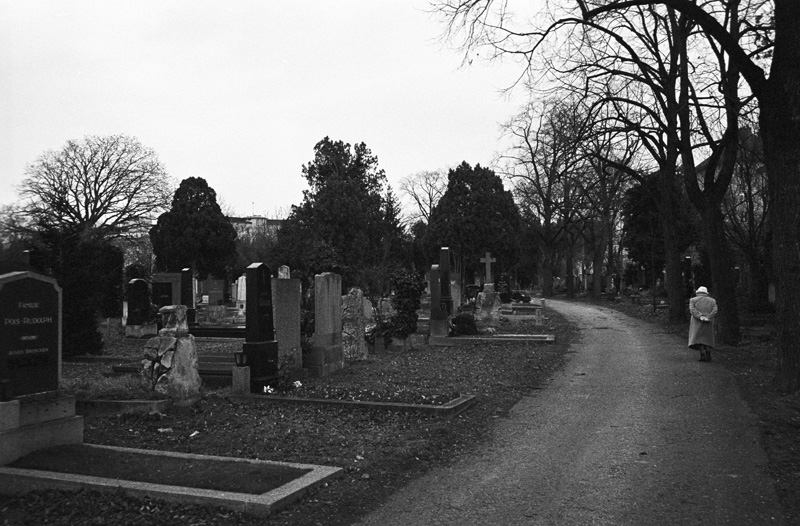
The slow decline. Vienna 2008 © Damaso Reyes
But as we read in an article in the New York Times, more and more European nations are moving to overhaul their pension systems even raising the retirement age. Clearly this important issue will continue to dog European voters and politicians and the number of retirees continues to grow over the next few decades and fewer and fewer young people replace them in the workforce.
Monday, August 11, 2008, 14:26 - Commentary, Photo of the Day
BrooklynAs many of you already know, a small scale war of sorts has been going on over the past few days between Russia and Georgia over the breakaway enclave of South Ossetia. It started when Georgia increased military operations to try to reclaim the province which has insisted on independence for the better part of the decade. Moscow, always interested in keeping its former satellites weak, has encouraged this even as it has brutally fought its own separatists in Chechnya.
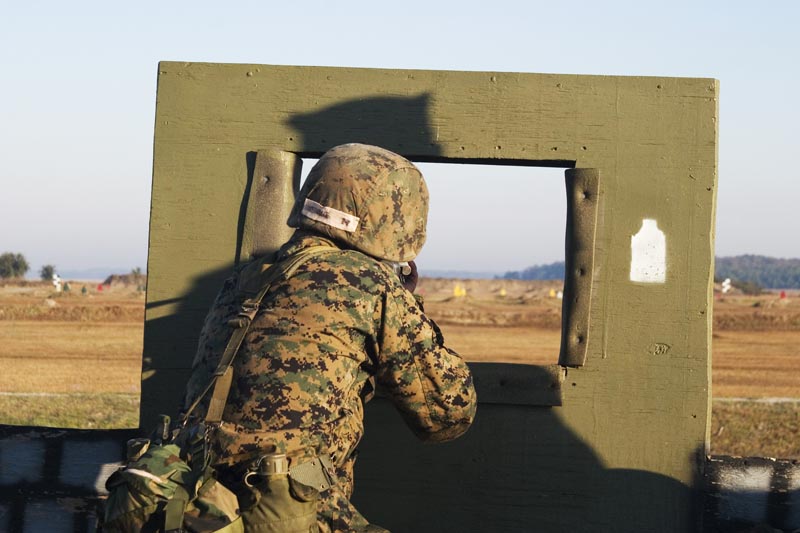
A sign of things to come? © Damaso Reyes
So what does all this mean? Well the interesting question many Georgians have asked as Russian forces bomb their capital is “where is the United States and the European Union?”
Ten years ago Russia was in a shambles in all senses: economically, politically and militarily. The strong hand of Vladimir Putin and rises prices for oil and natural gas has given Moscow power again. One reason why you don’t hear more than strongly worded statements coming from Europe is the Russia is one of the largest suppliers of natural gas to the European Union. This of course puts E.U. member states in a bit of a pickle: if they get in Moscow’s way they may find their shipments of gas inexplicably detoured, as the Ukraine discovered several times in the past few years.
It seems like the conflict in Georgia is winding down since Moscow has made its point, showing their smaller neighbor who is the tough guy in the region. But for those who fear the Russian bear this most recent conflict is a bad omen…
Saturday, August 9, 2008, 07:04 - Commentary
BrooklynFor those of you in New York, I will be presenting a slideshow of images from The Europeans today at 4:30 at The Spark, which is located at 161 West 22nd Street (6th & 7th Ave).
If you can’t come don’t worry, I plan on doing a few events this fall upon my return. In the meantime enjoy your HCB Quote of the Week!
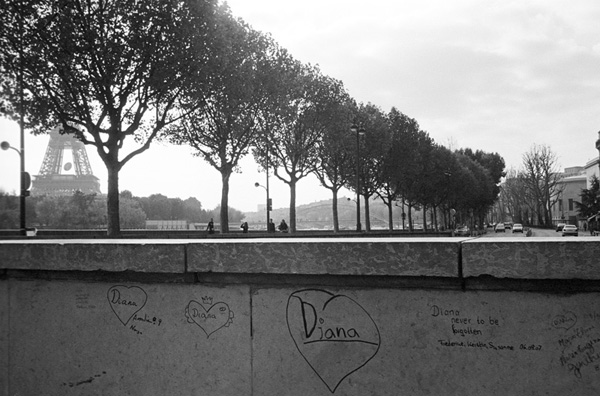
The handwriting on the wall. Paris 2007 © Damaso Reyes
Drawing with its graphology, elaborates what our consciousness grasps in an instant. - Henri Cartier-Bresson
Friday, August 8, 2008, 12:59 - Commentary, Photo of the Day
BrooklynIf we read a recent article in the EU Observer we can see what happens when nearly the nearly thirty member state of the European Union can’t coordinate their foreign policy.
“Twenty EU states will begin welcoming Kosovo passport holders after Pristina started issuing the new documents on Wednesday (30 July). Slovakia will not allow entry however, while the six other EU countries that do not recognize Kosovo have not made their position clear.”
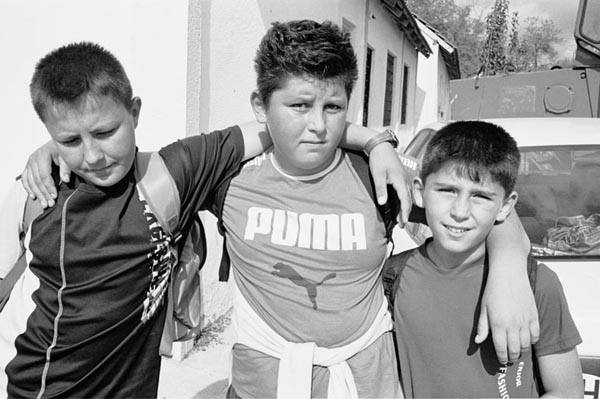
Can we has passports? Kosovo 2005 © Damaso Reyes
Countries including Spain, Greece and Portugal have not recognized Kosovo as an independent nation. The problem of course is that most countries in the E.U. are members of the borderless Schengen treaty zone which allows for free travel. So someone can legally enter Germany with their Kosovo passport but they can’t go to Spain even though there is no border control.
The issue of Kosovo is a prime example of why the E.U. needs a coherent foreign policy and the dangers of one. Nations like Spain with its Basque separatists don’t want to recognize Kosovo because they don’t want their own people getting any fancy ideas. At the same time it is clearly untenable that most of the E.U. recognizes Kosovo and a few don’t. I imagine at some point soon all the E.U. will have formal relations with Kosovo.
Back Next


 Calendar
Calendar




